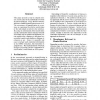Free Online Productivity Tools
i2Speak
i2Symbol
i2OCR
iTex2Img
iWeb2Print
iWeb2Shot
i2Type
iPdf2Split
iPdf2Merge
i2Bopomofo
i2Arabic
i2Style
i2Image
i2PDF
iLatex2Rtf
Sci2ools
COLING
1996
1996
Computation of Relative Social Status on the Basis of Honorification in Korean
This paper presents a way to compute relative social status of the individuals involved in Korean dialogue. Every Korean sentence indicates whether honorification occurs in it. The occurrence of honorification in a sentence is constrained by relative social status of the individuals involved in the sentence. By using the intbrmation about social status and the information about sentence-external individuals such as speaker and addressee, we can explain why a sentence is felicitous in a restricted context and whether a dialogue is coherent or not. Since it is possible and easy to include such contextual intormation in the IfPSG formalism, that formalism is adopted here. The implementation of Korean dialogue processing and the computation of social status is made based on ALE system. 1 Preliminaries In the conventional approach to honorification in Korcan, attention has becn paid to subject honorification and a scntencc itself though the Korean honorification system consists of three ty...
| Added | 02 Nov 2010 |
| Updated | 02 Nov 2010 |
| Type | Conference |
| Year | 1996 |
| Where | COLING |
| Authors | Done-Young Lee |
Comments (0)

